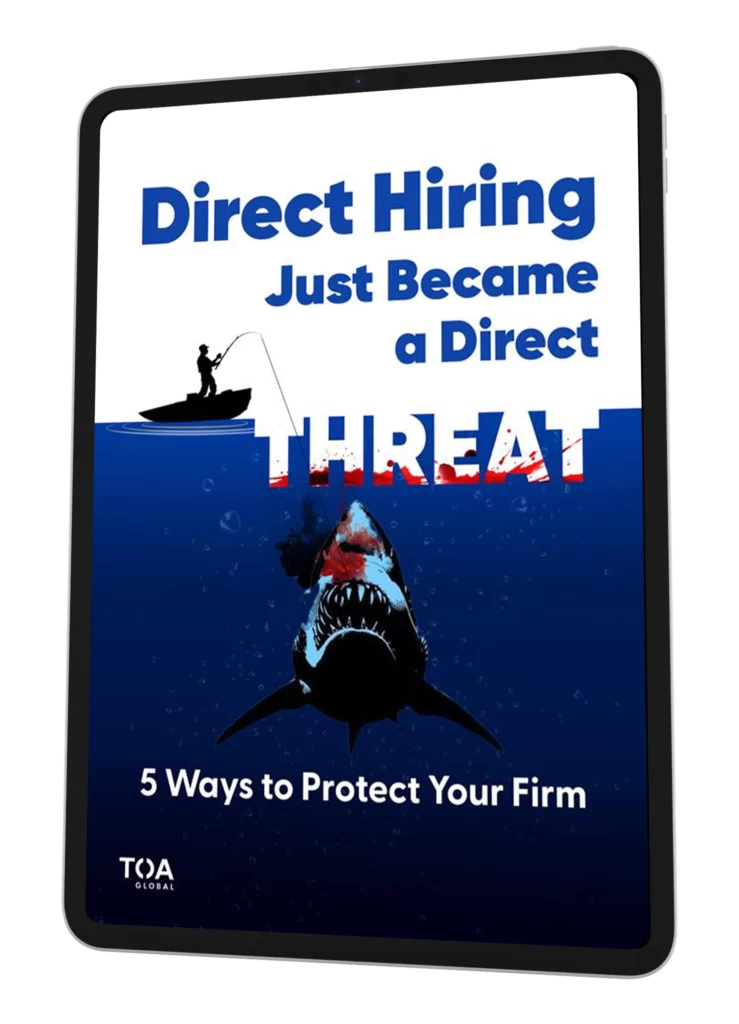So, you want to impress your recruiter.
You want to leave a lasting impression—a charm and presence that shines through the room (or the Zoom call).
So, you show up ready, armed with many years of experience, industry know-how, and bold and flashy credentials to boot.
That should do it, right?
Well, we hate to break it to you, but most recruiters have seen it all. Imagine how many resumes end up in the shredder, or how many competent, qualified candidates don’t even get shortlisted!
The real challenge is reaching the finish line, crushing the rest, and emerging as not just the best choice for the role, but the only choice!
We’d hate for your resume to end up in the HR bin. You have us on your team, and we’re here to help you snag that title!
With that said, here are some clever and practical tips on acing your accounting job interview!
Look the Part

Most people think accounting is unsexy—it’s dull, stuffy, and only for introverted math whizzes.
So, why bother thinking about what to wear, right?
Well, research begs to differ.
A study on job candidate perception suggests that how you dress influences how kind, empathetic, trustworthy, or likable you’re perceived.
We’ll save your time browsing through interview outfit guides—instead, use our pointers to ensemble, especially if you’re seeking a managerial role where confidence matters.
For Women
- Neutrals (black, brown, gray, or white) for blazer and inner top
- Straight-cut pants or culottes
For Men
- Neutrals (black, brown, gray, or white) for coat, collared undershirt, and necktie
- Well-fitted, non-baggy trousers
Ease Your Nerves

It’s normal to experience pre-interview anxiety, but when it becomes overwhelming, it can affect how recruiters see you.
A clinically elevated level of anxiety can manifest visibly on your body, like in jitters, fidgeting, or jerky speech.
While you shouldn’t punish yourself for experiencing unease or discomfort, you also don’t want the nerves to get the best of you.
- The 444 Breathing Exercise - inhale for four seconds, hold your breath for four, and exhale for four to slow your heart rate
- Stress Balls - squeeze a ball to release tension, pressure, or any intense inner emotion
- The 333 Grounding Technique - name three things you can hear, see, and move or touch to steady your focus
- Lip Trills - blow raspberries without using your voice or sticking your tongue out to loosen your facial muscles
- Positive Self-talk - practice self-compassion through encouraging and motivational pre-interview self-talk
Know Your Interviewer

If it’s the initial interview, you’re most likely not facing a panel right away.
In some cases, it’s HR. In others, it’s your possible manager. It could also be the person who posted the job online.
Research about them on LinkedIn while observing details like:
Their alma mater
Interests
Their circle/networks
Common causes
Common colleagues/higher-ups
Finding a common ground allows you to build rapport and even gauge your chemistry with your potential team.
Should the manager give the initial interview, pay attention to predictors of what it’s like to work at the company. Observe or ask about:
Their personality
Management style
Communication style
Work ethic
Other work-related and personal strengths and weaknesses
Read More: How to Recruit Accounting Staff
Make Themed Resumes and Portfolios
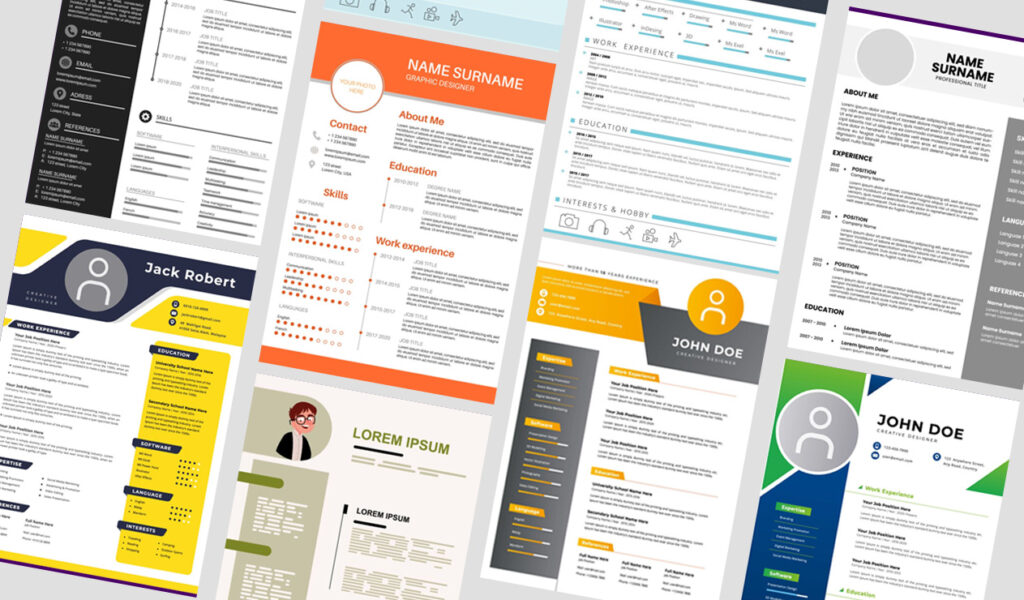
Let your creative juices flow in designing your resume!
Draw inspiration from the accounting tools you use daily, whether it’s software, spreadsheets, receipts, or other financial records.
Feel free to take some inspiration from this table:
| Inspiration | Creation |
|---|---|
| UI of a popular accounting software | A Xero/QuickBooks graph-inspired experiences section to indicate an AP clerk candidate's help with the company's 17.5% boost in billings |
| The format of a receipt | Educational institution in the left column, years studied in the right Previous companies in the left column, years worked in the right Boosts in processes/operations in the left column, percentages in the right |
| The format of a spreadsheet and its functions | Candidate name as the file title Objective, experience, and education in the actual spreadsheet |
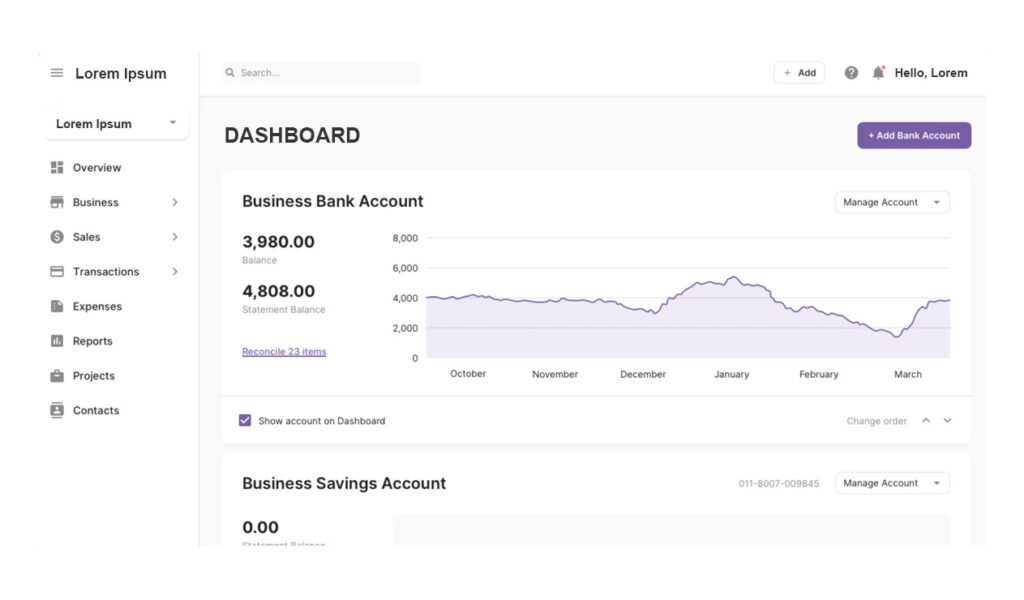
Here we have a resume that resembles a software interface.
But more than just being creative, following a theme means consistency in your messaging. Let your resume design echo in your interview answers. Incorporate bits from your daily life as an accounting professional into your story, both verbally and visually.
Go Paperless
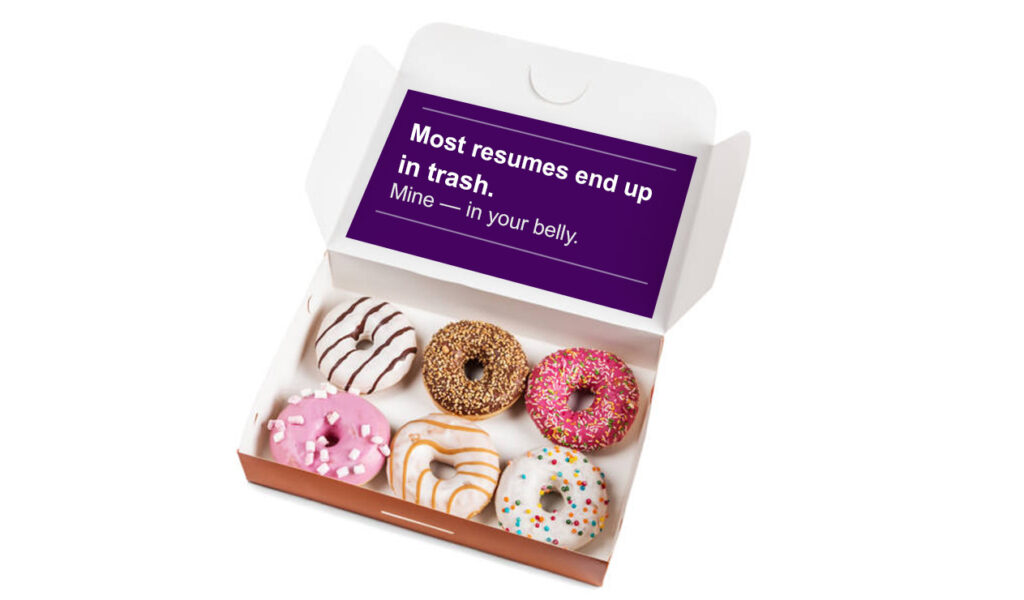
If you liked the creative resume bit, then we’d like to suggest something even more out-of-the-box.
Take cues from a Lithuanian man who delivered doughnuts to 40 companies in New York City. In those doughnut boxes were his resumes.
Sprinkling his good idea with even better copywriting, he writes in the boxes, “Most resumes end up in trash. Mine — in your belly.”
Despite no prior experience in such a tough, saturated market, his stunt landed him a total of 10 job interviews, on top of going viral on social media.
A smart (and sweet) move if you ask us.
Play the Numbers Game

Show them what you’re made of—through numbers.
Recruiters prefer to get mathematical: 34% increase in sales, 12% boost in productivity, 27% reduction in expenses.
Start by gathering samples of your best work, like charts, spreadsheets, or financial reports that show you’re crushing it in your niche!
If you don’t have hard data, you can use certifications or awards. Positive feedback, such as praise from your boss or a thank-you card from a client, also works.
Show the Specifics

It’s one thing to say you’ve done something, and another to show how you did it. Get down to the specifics so you stand out from the rest. In your resume, portfolio, and interview, use specific personal skills and experiences to fill in the following factors:
- Keywords from the job description (e.g. data analysis, accrual accounting, or financial documentation)
- Process-related concerns (e.g. spotting any human error in crucial transactions or financial records)
- Expertise in regulations and compliance (e.g. minimizing taxation from current accounting laws that could mean losses for the company)
Walk your interviewer through the process of how you completed a job, the challenges you experienced, and how you overcame them. For instance, an error that you spotted and corrected in the cash flow statement or a skipped step in the accounts payable process that you took accountability for.
Meanwhile, here are some skills that recruiters generally look for among candidates:
- Ability to create accurate financial reports/financial statements (e.g. income statements, balance sheets, cash flow statements)
- Ability to use correct business metrics and read the company's financial health accurately
- Knowledge of differences between accounting concepts (e.g. cash accounting vs. accrual accounting, accounts receivable vs. accounts payable)
- General knowledge in tax accounting (e.g. tax preparation, tax filings, tax liability)
- Knowledge of GAAP or generally accepted accounting principles
- Proficiency in using accounting software programs (e.g. Xero, Quickbooks, Karbon)
Mind Your Values
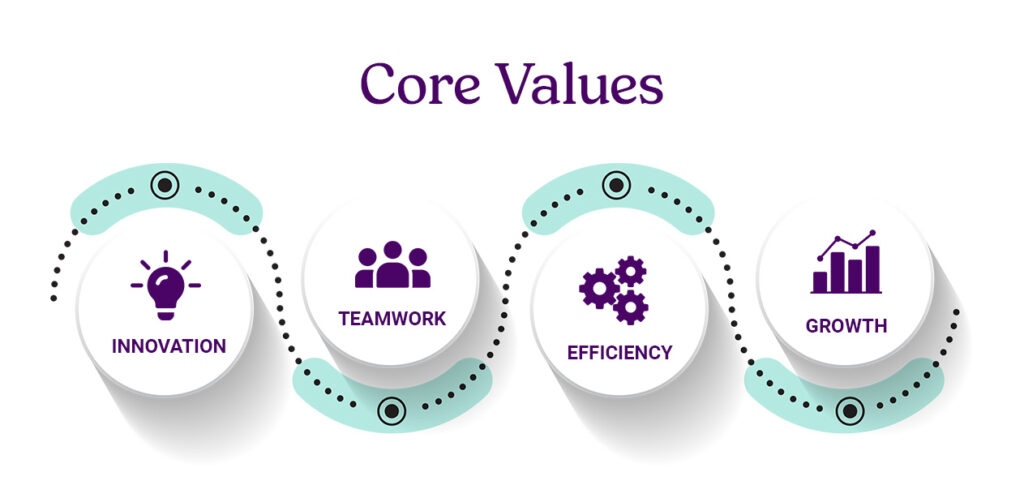
Learning company values is not just brushing up on trivia — you’re unlocking the secret code to corporate life! Make sure that your personal ethos aligns with that of your dream accounting firm. Show this to your interviewer by mentioning the company tagline, mission, or vision throughout the interview proper.
This relays to the recruiter that you’re not just another resume in the pile—you’re a thoughtful contender living out the company’s values in and out of the workplace.
Crack Some Accounting Jokes

Who says accounting job interviews can’t be funny?
Just because accounting jobs are data-driven, figures-focused, and calculation-centered doesn’t mean that the interviews should automatically be bland and monotonous.
To effectively break the ice and establish rapport with the recruiter, tell them an accounting season joke or industry-related current events. This doubles as proof that you’re up to date with current affairs!
As we’ve mentioned, you can always stick to your good old methods. But if you ask us, there’s nothing wrong with a little change-up to keep either side of the interview table engaged.
Read More: 60 Accounting Pick Up Lines That Add Up!
Send Thanks
Most would think that sending a thank-you note after an interview can help you stand out, yet it’s surprising how few actually do it.
Take the time to email your interviewer/s to express your gratitude to them for getting to know you, mentioning how you enjoyed meeting them, learning more about the company, and restating your interest in the position.
Remember that your note should be concise — brief yet punchy, short yet thoughtful.
Time Your Follow Up
Still haven't heard back from HR? It's time to give them a gentle bump.
The average time for following up is either shortly after the interview, typically a few hours or so. This shows the interviewer your enthusiasm and interest in the position, without coming off as too pushy.
Waiting too long can make you seem disinterested, while reaching out too soon can be overwhelming for the hiring manager.
Ideally, you'll want to wait about one week after the interview to send a polite follow-up email or make a brief phone call, allowing them enough time to keep you fresh in their mind, whittle down their list with renewed clarity, and hopefully end up choosing you.
Beyond Accounting Interviews: Elite Global Talent Teams
Firing killer interview questions. Answering them with utmost confidence. Securing your dream job. This paints us an ideal picture, but it’s not as easy as it looks. It takes research, passion, and hard work so that everything falls into place and you end up with the best possible outcome.
Whether you’re getting ready for a job interview or assembling a talent team, we’ve got something for you. Book a chat with us to get started.














